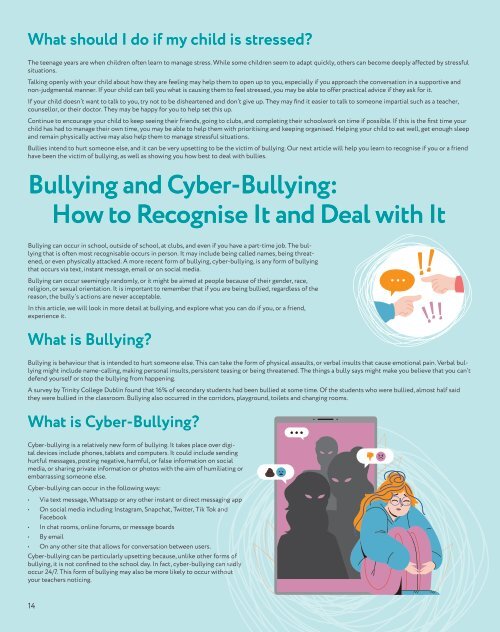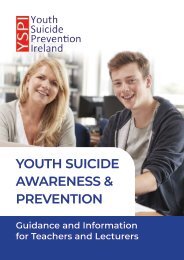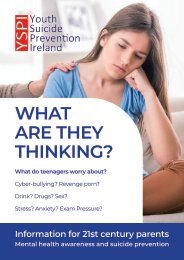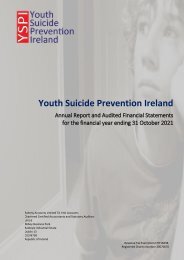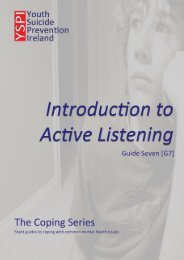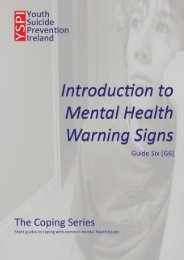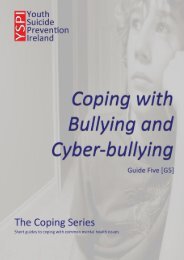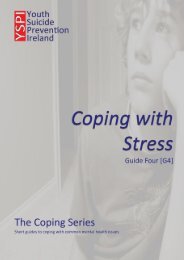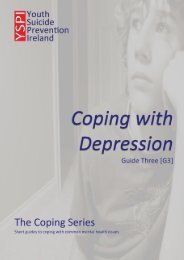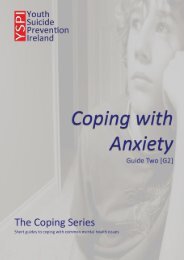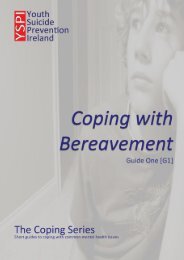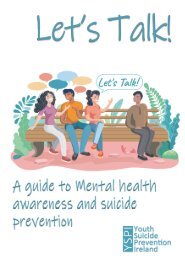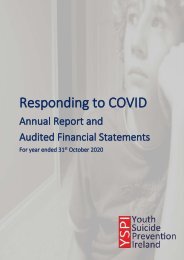Let's Talk About Mental Health
Written by Dr Hannah Farnsworth this magazine provides guidance on common mental health issues with coping strategies and support information. Topics covered include Anxiety, Stress, Depression, Bullying & Cyber-bullying, Warnings Signs of Mental Health Crises and an introduction to Active Listening. This guide is written by a registered medical practitioner and is suitable for ages 16+. Parents are advised to read the guide before letting under 16s have access.
Written by Dr Hannah Farnsworth this magazine provides guidance on common mental health issues with coping strategies and support information. Topics covered include Anxiety, Stress, Depression, Bullying & Cyber-bullying, Warnings Signs of Mental Health Crises and an introduction to Active Listening.
This guide is written by a registered medical practitioner and is suitable for ages 16+. Parents are advised to read the guide before letting under 16s have access.
Create successful ePaper yourself
Turn your PDF publications into a flip-book with our unique Google optimized e-Paper software.
What should I do if my child is stressed?<br />
The teenage years are when children often learn to manage stress. While some children seem to adapt quickly, others can become deeply affected by stressful<br />
situations.<br />
<strong>Talk</strong>ing openly with your child about how they are feeling may help them to open up to you, especially if you approach the conversation in a supportive and<br />
non-judgmental manner. If your child can tell you what is causing them to feel stressed, you may be able to offer practical advice if they ask for it.<br />
If your child doesn’t want to talk to you, try not to be disheartened and don’t give up. They may find it easier to talk to someone impartial such as a teacher,<br />
counsellor, or their doctor. They may be happy for you to help set this up.<br />
Continue to encourage your child to keep seeing their friends, going to clubs, and completing their schoolwork on time if possible. If this is the first time your<br />
child has had to manage their own time, you may be able to help them with prioritising and keeping organised. Helping your child to eat well, get enough sleep<br />
and remain physically active may also help them to manage stressful situations.<br />
Bullies intend to hurt someone else, and it can be very upsetting to be the victim of bullying. Our next article will help you learn to recognise if you or a friend<br />
have been the victim of bullying, as well as showing you how best to deal with bullies.<br />
Bullying and Cyber-Bullying:<br />
How to Recognise It and Deal with It<br />
Bullying can occur in school, outside of school, at clubs, and even if you have a part-time job. The bullying<br />
that is often most recognisable occurs in person. It may include being called names, being threatened,<br />
or even physically attacked. A more recent form of bullying, cyber-bullying, is any form of bullying<br />
that occurs via text, instant message, email or on social media.<br />
Bullying can occur seemingly randomly, or it might be aimed at people because of their gender, race,<br />
religion, or sexual orientation. It is important to remember that if you are being bullied, regardless of the<br />
reason, the bully’s actions are never acceptable.<br />
In this article, we will look in more detail at bullying, and explore what you can do if you, or a friend,<br />
experience it.<br />
What is Bullying?<br />
Bullying is behaviour that is intended to hurt someone else. This can take the form of physical assaults, or verbal insults that cause emotional pain. Verbal bullying<br />
might include name-calling, making personal insults, persistent teasing or being threatened. The things a bully says might make you believe that you can’t<br />
defend yourself or stop the bullying from happening.<br />
A survey by Trinity College Dublin found that 16% of secondary students had been bullied at some time. Of the students who were bullied, almost half said<br />
they were bullied in the classroom. Bullying also occurred in the corridors, playground, toilets and changing rooms.<br />
What is Cyber-Bullying?<br />
Cyber-bullying is a relatively new form of bullying. It takes place over digital<br />
devices include phones, tablets and computers. It could include sending<br />
hurtful messages, posting negative, harmful, or false information on social<br />
media, or sharing private information or photos with the aim of humiliating or<br />
embarrassing someone else.<br />
Cyber-bullying can occur in the following ways:<br />
• Via text message, Whatsapp or any other instant or direct messaging app<br />
• On social media including Instagram, Snapchat, Twitter, Tik Tok and<br />
Facebook<br />
• In chat rooms, online forums, or message boards<br />
• By email<br />
• On any other site that allows for conversation between users.<br />
Cyber-bullying can be particularly upsetting because, unlike other forms of<br />
bullying, it is not confined to the school day. In fact, cyber-bullying can sadly<br />
occur 24/7. This form of bullying may also be more likely to occur without<br />
your teachers noticing.<br />
14


